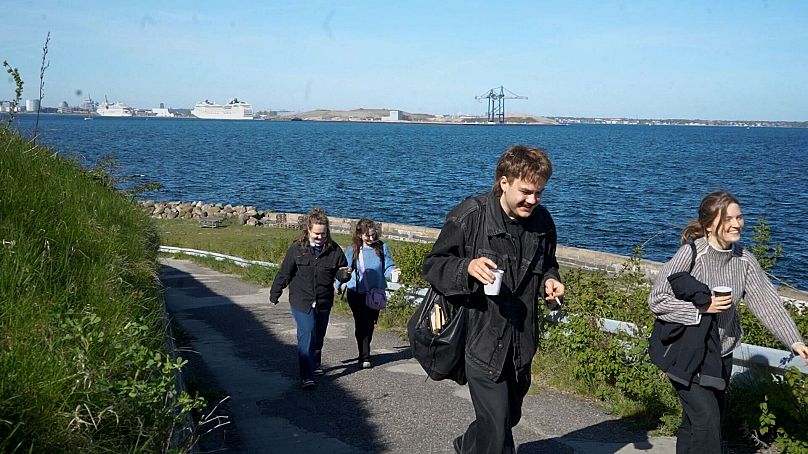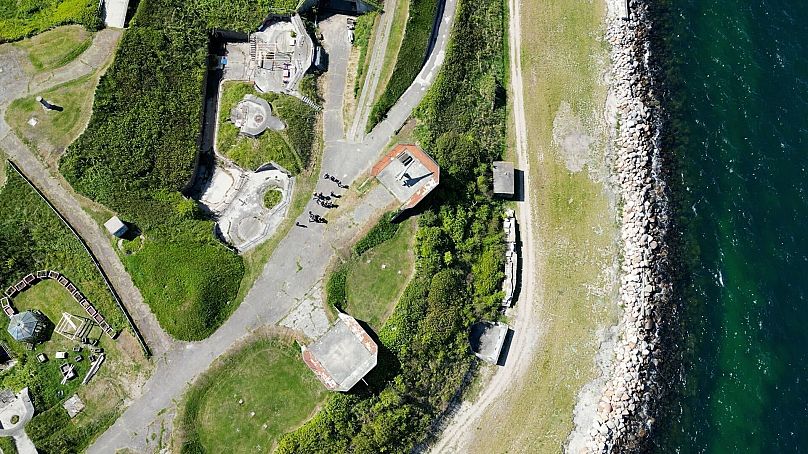Exams are often associated with pressure, long nights of cramming, and the desperate search for a comfortable spot to study.
But what if you could leave all that behind and step away from distractions?
A small island off the coast of Denmark - about a 30-minute boat ride away from Copenhagen - is offering the opportunity to do exactly that.
Dubbed Ungdomsøen, or "The Youth Island" in English, the former naval fortress plays host to university students who are invited for a study retreat designed to help them concentrate on their coursework - and also give them room to breathe.
The island is run by Ungdomsøen Foundation, an NGO that organises the study retreat for all students in the capital wanting to flee everyday life.
Mina Kjeldsen, the project manager behind this initiative, says the motivation is to offer an accessible place for a wide range of students to focus on and help each other with their studies and exam preparations.
"If it's hard to finish your exam and it's stressful, it's nice to feel like you're in it together," Kjeldsen added.
According to Kjeldsen, the initiative brings together 20 to 40 students at a time for a couple of days of communal living, academic work, and structured downtime.
Participants arrive by boat and are encouraged to completely disconnect from city life.
The 70,000 m2 artificial island offers fresh air, open space, and a quiet rhythm that contrast sharply with the pace of student life on the mainland.
"I've always heard a lot of criticism about finding new spots in Copenhagen to study. You get tired of one cafe because it's too busy, and then you go to another one and you get distracted and you can't be at your school because you're there every day," Sol Rem Rasmussen, one of the event hosts and a volunteer on Ungdomsøen, told Euronews Next.
"You don’t have the noise, you just have sun and blue sky and some nice places to study. It’s not really an option to be stressed by your everyday life. You get to go away," Rasmussen added.
A different kind of study environment
During the day, students work on group projects, exam papers, and thesis drafts. Some of them came by themselves, others alongside their classmates.
Andreas, an English Literature student, learned about the study retreat when he was stressed about his thesis and thought it was a "perfect opportunity" to distance himself from the city’s distractions.
He has set himself the ambitious goal of writing 15 to 20 pages of a draft of it while he’s on the island.
Angelyn, a prehistoric archaeology student, came back to participate for the second time as she believes being outside during breaks helps to refresh herself.
"Also, we have to wake up at the same time and everything. So it kind of keeps you focused and you're just not lying in bed too long," she explained.

"It’s very different from sitting in the library with all the other students, stressing out. It’s nice to have a place like this," Mareike, a Social Entrepreneurship and Management student from Roskilde University, told Euronews Next.
According to environmental psychologists, the isolation that an environment like this island offers can actually help with stress management and focus for students.
"One important aspect of regaining focus and being able to focus more effortlessly is to reduce the number of distractions by stepping out of your routine, stepping out of your normal environments to a place where there's not so much calling for your attention," Freddie Lymeus, a researcher in environmental psychology at Uppsala University in Sweden, told Euronews Next.
Alongside peer-to-peer support, the retreat also offers professional supervision. Lecturers from Roskilde University were invited to provide one-on-one guidance to students working on longer projects or theses.
"We have 45-minute sessions where students tell us about their research," Mette Apollo Rasmussen, a researcher at the university, told Euronews Next.
"We get a chance to sit quietly down and get a bit into depth with the different students' research," she added.
Researchers say the isolation of the island actually strengthens the writing process.
"As researchers, we know that focus is really, really important… Here, you can’t just leave. The boat only leaves tomorrow. So you’re forced to stay within your process. When you get stuck, you take a break. But you stay with it. And you move forward," Maria Duclos Lindstrøm, another researcher at Roskilde University, added.
Shared meals and saunas
The retreat balances intense academic focus with moments of relaxation and socialising.
Evenings are spent cooking together, eating around shared tables, and sometimes winding down in a seaside sauna or taking a swim. The idea is to bring students into contact not just with their work, but with one another.
"When you’re also cooking dinner together and talking, you take that pressure off," Rasmussen said.
"You see each other in other settings, and that helps people talk about the difficulties they’re having with studying," they added.
Organisers of this initiative believe this informal support system can be as important as any academic feedback. They say students often arrive not knowing each other, but leave with shared experiences and new perspectives.
"We just had a conversation with a group who said it's actually really nice to talk to other people about how they feel about the master thesis, because very often we don't discuss how we feel," Lindstrøm said.
Participants sleep in dorms or outdoor shelters and have the option to spend most of their time outdoors while studying, walking, and resting.
"What I'm looking forward to is definitely sleeping outside, but also studying at the same time," Mattias, a product development and technical integration student at Copenhagen School of Design and Technology, told Euronews Next.
Lymeus says it's encouraging to see those types of initiatives.
"It has to be understood from the background that university students, given their socioeconomic backgrounds and demographics, are generally much more unhealthy in a psychological sense than they should be," Lymeus said.
He says contact with nature, especially combined with group activities, is one of the solutions.
"A large amount of research conducted over several decades supports the idea that when we are in contact with nature, we tend to reduce stress levels, regain creativity and concentration, improve mood, creativity and openness and many other good things that will help a person perform in studies as well," he added.

A youth-led experiment in community learning
The retreat is organised by young volunteers who live on the island for a year, hosting visitors and developing projects aimed at young people’s growth and participation.
They hope that, in this setting, students not only work on their exams but also on how they relate to learning and each other.
"We bring our own values," said Rasmussen. "We focus on diversity and making space for everyone to feel comfortable. That’s part of the room we create here".
The vision of Ungdomsøen, which receives funding from the Copenhagen municipality and Danish companies, is to “help young people discover what they can achieve when focus, collaboration, and community come together” by creating a temporary space away from everyday life.
It offers more than 20 bedrooms in a massive building that was used as accommodation for the Danish Navy. The building was renovated when the island opened to young people in Denmark in 2019.
The artificial island was built in 1894 as a military fort. At the time of its completion, it was considered the largest sea fort in the world and remains the largest manmade island without an abutment.
While initiatives like this study retreat are commendable, Lymeus says, it could be costly to implement for other cities and universities.
"Another way of approaching it could be to work with reconstructing or reinventing the environments that we're living and working in to be generally more supportive of this type of thing," said Lymeus.
"I think it's a very interesting and commendable initiative. And many universities could probably do more in terms of also using the spaces that they already have".
For more on this story, watch the video in the media player above.







